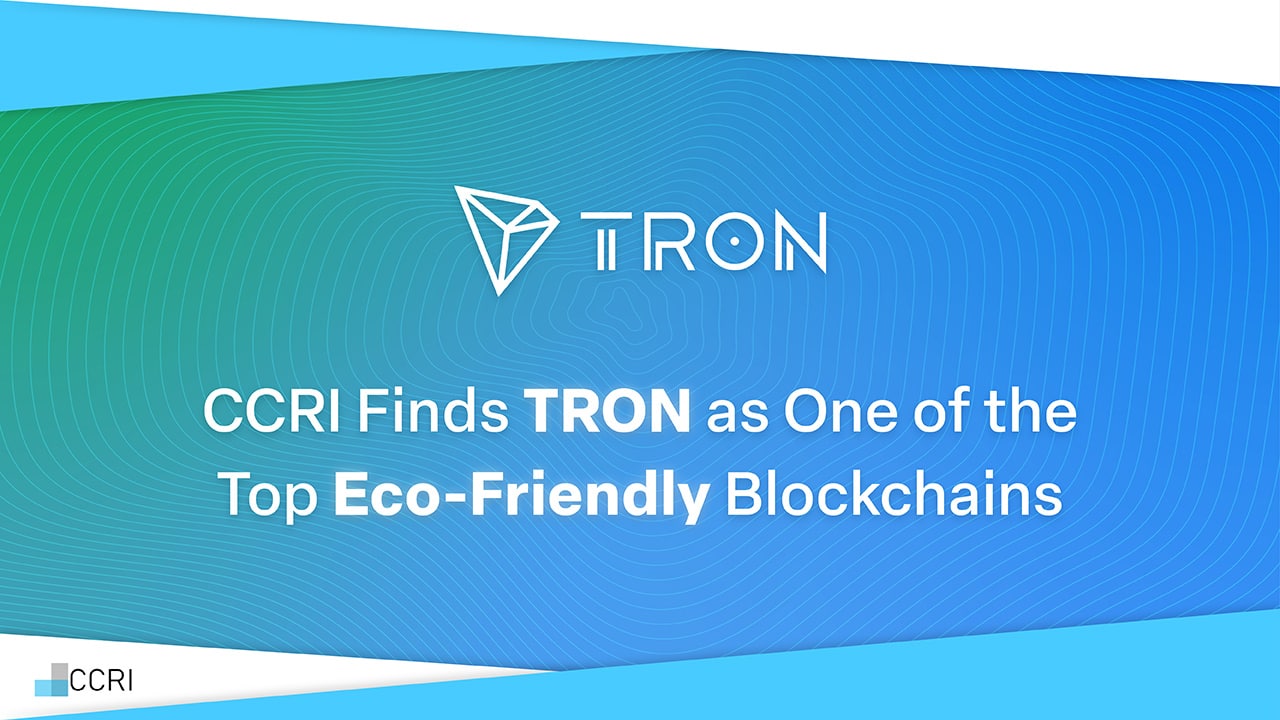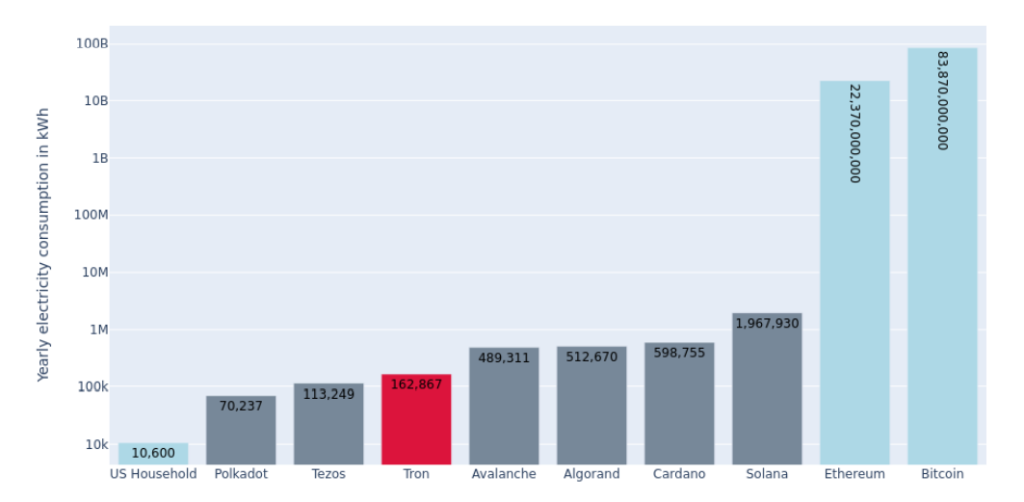Bitcoin.com Media
Bitcoin.com is the premier source for all things crypto. Contact [email protected] to discuss press releases, sponsored posts, podcasts and other options.
all about cryptop referances

sponsored
A new report by Crypto Carbon Ratings Institute (CCRI) shows the environmental sustainability of TRON network. According to the report “Energy Efficiency and Carbon Footprint of the TRON Blockchain”, the highly popular TRON network only uses as much electricity as only fifteen average American households.
The environmental sustainability of the TRON network
The electricity consumption and related carbon footprint of Bitcoin and other cryptocurrencies have been the subject of extensive discussion in the public, academia and industry. There are various estimates, which compare the electricity consumption of Bitcoin and other cryptocurrencies with different medium-sized countries. The problem has been known for several years, and other systems and technologies have emerged to try to solve the problem.
The consensus mechanism of Proof of Stake (PoS) is considered to be superior in terms of power requirements compared to the traditional Proof of Work (PoW) consensus mechanisms. While there is consensus in the wider scientific community that PoS does not exhibit the same power issues as PoW, the responsibilities of individual PoS systems are usually less clear.
Due to the nature of the software development process and network architectures, different PoS systems rely on different fundamental requirements regarding hardware requirements, programming languages, network size, transaction throughput, transaction complexity, and more. These factors affect the power consumption and thus the carbon footprint of a respective network.
Since a comprehensive analysis of the power consumption and carbon footprint was not available for the cryptocurrency TRON, the report aimed to provide insight into, investigate and include the power consumption, carbon footprint and influencing factors of the TRON Proof of Stake blockchain network.
According to the survey, the report can state that the TRON network has 367 nodes, 2.317 billion transactions per yearit total annual electricity consumption is 162,867.85 kWh, electricity per node is 443.78 kWh/year, electricity per transaction is 0.07 Whand total carbon emissions are 69.47/year. The results were extrapolated based on the assumption of the number of transactions that occurred during the measurement period of one day to an annual transaction figure necessary to contextualize the power consumption.
Based on the method used, outlined in the report as four steps to reach a result, the report can conclude that the TRON network is an environmentally sustainable network system. The report outlines an approach for calculating the TRON network’s power consumption and carbon footprint. Then, the investigation team selected the right hardware, made measurements of the protocol and calculated respective calculations, including important ones like using the Bitcoin and Ethereum networks for comparison.
As mentioned earlier, the team estimated the annual electricity consumption of the Proof of Stake network to be 162,867.85 kWh; this results in a carbon footprint of 69.47 tonnes CO2e annually. Compared to other electricity consumers, such as the average American household, the network uses only about 15 times the electricity and produces 11 times the amount of an intercontinental round-trip flight.
Overall, emissions from the network are very low, especially compared to the other PoS networks such as Avalanche, Algorand, Cardano and Solana.

TRON’s unique delegated proof of stake
Decentralization is built from the ground up. The core vision of TRON is to decentralize the internet, and TRON’s strong foundation has led to a successful grassroots process that allows TRON to operate according to that vision. Decentralized protocol governance is achieved at a fundamental level through decentralization of consensus. Several different types of consensus mechanisms are available for blockchains, each with their advantages and disadvantages.
Instead of a traditional PoS consensus mechanism, TRON uses delegated proof-of-stake (DPoS) to better achieve decentralization. Unlike PoS, DPoS increases the power of the community to select nodes to approve blocks of transactions. Just as building on a blockchain does not create decentralization by default, DPoS does not automatically create a strong foundation for a decentralized system.
In the TRON ecosystem, the community elects 27 block validators to serve as “super representatives” (SRs) every six hours for this important task. These SRs are openly voted and chosen by the community of users who stake their TRX, TRON’s native token, in the blockchain system. Regardless of the amount of TRX staked, each SR can only cast one vote, effectively giving it only 3.7% of the actual voting power.
By eliminating governing power based on staked assets, TRON has created an even distribution of governing power that avoids centralized control. As a result, TRON’s adaptation to DPoS has created a stronger foundation for decentralization than other PoS blockchains.
Like any blockchain network, TRON’s network is also composed of distributed nodes, which form the core of the network’s infrastructure. They are essential for decentralization, and TRON’s nodes are energy efficient. According to the report, the marginal power consumption per transaction for a single node is 0.0007245 Ws. The team used Carbon Footprint’s site-specific emission factors to calculate the average carbon intensity in the country where a TRON node is located. Based on the emissions calculated for the TRON network, the report states that one can conclude that this DPoS-based blockchain protocol uses an amount of electricity that does not even justify the discussions about its environmental impact at the current level, and that TRON is an environmentally conscious. and sustainable blockchain networks.
To learn more about the TRON network check the latest developments at TRON.Network, Telegram, Disagreement, Reddit, GitHuband Twitter.
This is a sponsored post. Find out how to reach our audience here. Read disclaimer below.
Image credit: Shutterstock, Pixabay, Wiki Commons
Disclaimer: This article is for informational purposes only. It is not a direct offer or solicitation of an offer to buy or sell, or an endorsement or recommendation of products, services or companies. Bitcoin.com does not provide investment, tax, legal or accounting advice. Neither the company nor the author is directly or indirectly responsible for damages or losses caused or alleged to be caused by or in connection with the use of or reliance on content, goods or services mentioned in this article.